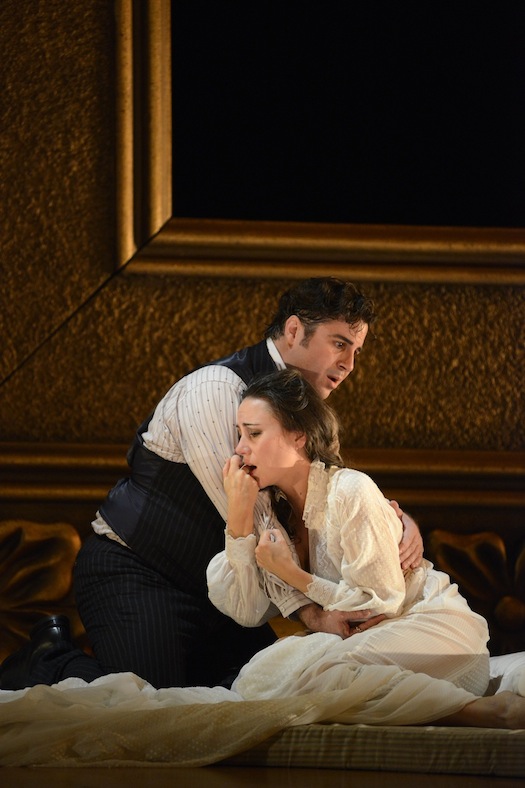Boston Lyric opens season with a heartfelt yet underwhelming “Traviata”

Anya Matanovic and Michael Wade Lee in Verdi’s “La Traviata” at Boston Lyric Opera. Photo: Eric Antoniou
Boston Lyric Opera opened its season with one of the most popular and reliable operas in the repertoire. It’s difficult to score a miss with Verdi’s La Traviata, and maybe this was what the company had in mind by casting a Violetta and Alfredo who have never sung the part before. The result was a heartfelt, touching, but slightly underwhelming performance at the Shubert Theatre on Friday night, with the two leads alternating between very fine singing and stretches of playing it safe.
The story of La Traviata is widely familiar, if only due to its many populist reincarnations (Camille with Greta Garbo and Moulin Rouge, for example). Violetta, the consumptive Parisian courtesan who later redeems herself through love, is the heart of the opera. She is played here by Anya Matanovic in her BLO debut. Matanovic certainly looked the part of Violetta and acted it wonderfully—commanding attention in the opening scene party, and, in the last act, expiring in an impossibly long, pale gown. It was clear that she understood the role and identified with it.
But Matanovic’s musical reading, though very fine in parts, fell short of a full characterization. She was most affecting in quieter moments: the beginning of “Addio del passato,” for example, and much of the last act, which showcased her pure, burnished tone. Her “Sempre libera” was controlled if not very smooth, though capped with a (slightly sharpened) E flat.
Her confrontations with Germont and Alfredo were passionate and affecting—for the most part. Perhaps her scene with Alfredo at the end of the second act best encapsulated her singing of the evening. Violetta’s phrases when embracing Alfredo, knowing that she would have to leave him, were full-bodied, perfectly measured, and touching. But the climactic moment that followed (“Amami, Alfredo”) was cautious, the high note cresting the phrase only touched before leaving. The original title of La Traviata, before censors got their hands on it, was Amore e Morte, and one wishes Matanovic could have given a little more of both onstage.
Michael Wade Lee, also making his BLO debut, presented a different set of contradictions as Alfredo. To the role, he brought a clean, forward tone that bloomed in the upper register, as well as stylishly elegant phrasing. He was best in moments that played to these bel canto strengths, such as the second act opener, “De’ miei bollenti spiriti,” and particularly the last act duet, “Parigi, o cara,” which was truly a moment of tender calm. He was most puzzling in moments that required him to act with any subtlety. At the end of the second act, when Violetta is in tears over her impending departure, this Alfredo could only muster indifference. When he finally read Violetta’s farewell note, his mild reaction seemed more as though he had received a poor test score.
The most consistently satisfying of the principles was Weston Hurt as Alfredo’s father, Giorgio Germont. He brought an appropriately tender and sympathetic tone to the long second act duet, in which the elder Germont convinces Violetta to sacrifice her love for Alfredo. He also brought a more full-bodied and passionate sound to the elder Germont’s few outburts, and, importantly, knew how to press the conductor forward in those moments, as per the Italianate musical language.
Arthur Fagen’s conducting was, like the singing of the principals, something of a mixed bag. The first act Prelude was gorgeous, replete with ethereal strings and delicately calibrated dynamics. He followed this up with a tepid pace that lasted the entire party scene. The idea seemed to be to create differences between the first and second party scenes as a parallel to societal changes that took place at the time of the story. Its effect, though, was to stifle the moment of Violetta and Alfredo’s first meeting. Other than a few sagging tempos, though, Fagen’s conducting was otherwise admirable, in particular showing great attentiveness to Verdi’s orchestration. As well, the chorus sang with panache and polish.
The smaller roles were rounded out well, with a striking Flora played by Chelsea Basler and a stentorian Baron Douphol by David Kravitz, both BLO regulars. Rachel Hauge was a sympathetic Annina, and David Cushing brought plenty of bystander anguish to Doctor Grenville. He might have been highly puzzled by the final moments of the opera, however. In this staging—spare and, in the last act, delicately lit—Violetta never manages to hit the floor. Alfredo instead lifts her up and holds her awkwardly across his waist, as though presenting her to the audience: a rather odd way to express grief.
La Traviata will be repeated October 12, 15, 17, and 19 at the Shubert Theatre. blo.org
Posted in Performances





Posted Oct 16, 2014 at 10:19 pm by Dorothy Collier
Hi and thank you for the review. My friends and I attended Wednesday night’s dazzling performance and LOVED it! Could you please help with a question about the tenor who played Alfredo and whose voice, although rich in quality, seemed to indicate problems maintaining the pitch on multiple occasions, especially ending notes. And, do you think Alfredo struggled with achieving harmonic precision in the duet with Violetta….Or, do you think I imagined this?
Thank you, D.